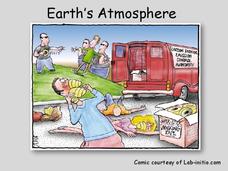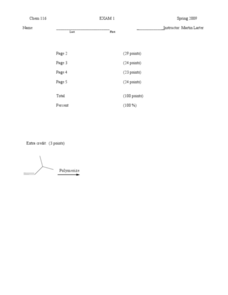Curated OER
Grow an Alum Crystal
What an exciting lab experiment to conduct with your high school chemistry class! Crystals are formed naturally in the environment. However, allow your blossoming chemists to create their own unique crystals using alum and...
Virginia Department of Education
A Crystal Lab
Young chemists grow ionic crystals, metallic crystals, and supersaturated crystals in three different lab experiments. Observing these under a microscope allows pupils to compare the various structures.
Kenan Fellows
Sensors in Chemistry
The Environmental Protection Agency monitors sensors to track air pollution and set clean air standards. Enthusiastic young scientists use similar sensors to gather data in their area and then apply the gas laws and conservation of...
Curated OER
Unit 3 Bonding
An organized table charting the different types of chemical bonds arrays this resource. The octet rule, ionization energy, and the naming of compounds are also reviewed. Young chemists answer review questions in multiple choice fashion....
Curated OER
Ranking Molecular Properties Based Upon Intermolecular Forces
A splendid chart of information about chemical bonding tops the first page. In it you will find information on London forces, permanent dipoles, hydrogen bonds, ionic bonds, and covalent bonds. A four-step process for assigning...
National Institute of Open Schooling
Chemical Bonding
Name is Bond, covalent bond. Through readings and answering questions, classes explore the different types of chemical bonds, their characteristics, valence shell electron pair repulsion theory, and atomic orbitals.
Biology Junction
Biochemistry of Cells
Chemistry and biology work hand in hand, without one you literally wouldn't have the other. Using a presentation, individuals learn about plant cells, animal cells, cell responses, macromolecules, DNA bases, and so much more. A worksheet...
Curated OER
Gases and Plasmas
Students determine what plasma is and why the sun is made up of plasma. They recognize situations where plasmas are found in nature and made by man. They discuss why the sun is a huge ball of plasma and if there are different levels of...
Biology Junction
Water Properties and More
Did you know many insects use cohesion or surface tension to walk on water? Using a presentation, scholars learn the more important properties of water. It extends into the concepts of solutions, suspensions, pH, and more.
Cornell University
Study Soil
What's in soil? Young scientists study the pH levels of soil from their school yard. They observe the land and area the soil came from to decide if location has anything to do with acidity level.
Curated OER
Chapter 12 Worksheet - Ions, Ionic Bonding, anc Covalent Bonding
Four pages provide plenty of problem solving practice for chemistry whizzes. They answer questions and write electron configurations for ions. They use Lewis dot diagrams to display equations. Covalent bonds are explored. The last half...
Curated OER
Cellular Respiration: Harvesting Chemical Energy
A complete overview of oxidation, reduction, and how electrons are moved in respiration. You could use this slide show to elaborate on the concept of harvesting stored energy, and to summarize the stages of aerobic and anaerobic metabolism.
Chymist
Esters: An Introduction to Organic Chemistry Reactions
Scratch and sniff an introduction to organic chemical reactions. A creative lesson has individuals study the esters commonly used in scratch-and-sniff stickers and advertisements. Following the lab procedure, scholars create the organic...
American Chemical Society
Air, It's Really There
Love is in the air? Wrong — nitrogen, oxygen, and carbon dioxide are in the air. The final lesson in the series of five covers the impact of temperature on gases. Scholars view a demonstration of gas as a type of matter before performing...
Normal Community High School
Classification of Matter
Steel is an example of homogeneous mixture, also called an alloy, which is made of iron and carbon. The presentation introduces learners to elements, compounds, and mixtures. They explore their similarities and differences, and then take...
Colorado State University
Why Can Warm Air "Hold" More Moisture than Cold Air?—Vapor Pressure Exercise
Does it feel a little humid in here? Learners assume the role of water vapor in the atmosphere as they explore the differences between warm and cold air. They roll dice to determine their level of energy, which determines if they...
Creative Chemistry
Maths for AS Chemistry
No practice problems are given on this handout; it is a detailed list of concepts to know and tips for working related problems in chemistry. Give this to learners as a study guide, or use it early in your career as a chemistry...
Curated OER
The Nature of Salt
High schoolers record information from the periodic table for sodium and chloride. They determine whether salts are molecular or ionic compounds, along with sodium chloride's molecular weight, and relative weights
Curated OER
WS 7.1 Kinetic-Molecular Theory of Gases/Pressure
In this kinetic molecular theory worksheet, students summarize the points of the kinetic molecular theory, they answer questions about pressure, and draw diagrams to show how suction cups, drinking straws and barometers work.
Science Geek
Earth's Atmosphere
Ozone gas absorbs the harmful UV-B rays and helps protect humans. An informative presentation begins with the layers of the earth's atmosphere, the pressure and temperature in each of the layers, the ozone layer, the ozone cycle,...
Science Geek
Periodic Trends
If your pupils think Um is the element of confusion, this presentation on period trends can only help. It covers the patterns for atomic radii, ionization energy, and electronegativity across a period and down a group.
Curated OER
Organic Chemistry Problem Set Exam 1
Though there are technically only 13 questions on this exam, they take up six pages and make a thorough assessment of organic chemistry principles. There are plenty of diagrams to label or complete. Emission spectra are displayed for...
Curated OER
Chemistry 116 Exam 1, Spring 2009
This five-page exam was designed for a biochemistry and organic chemistry course. It covers the molecular geometry and properties of organic comounds. Test takers identify compounds, functional groups, and isomers. They draw Lewis...
Annenberg Foundation
Geometry 3D Shapes: Euler's Theorem
How do you get a theorem named after you? Euler knows what it takes! The third lesson of five asks pupils to use an interactive activity to compare the faces, vertices, and edges of seven different three-dimensional solids. They use...
Other popular searches
- Gumdrop Atoms and Molecules
- Counting Atoms Molecules
- Making Atoms and Molecules
- Atoms & Molecules Ppt
- Matter Atoms Molecules
- Science, Atoms and Molecules
- Science Atoms and Molecules
- Atoms Molecules Elements
- Atoms & Molecules Pot
- Atoms and Molecules Lesson
- Atoms Molecules Units
- Atoms and Molecules Musical

























